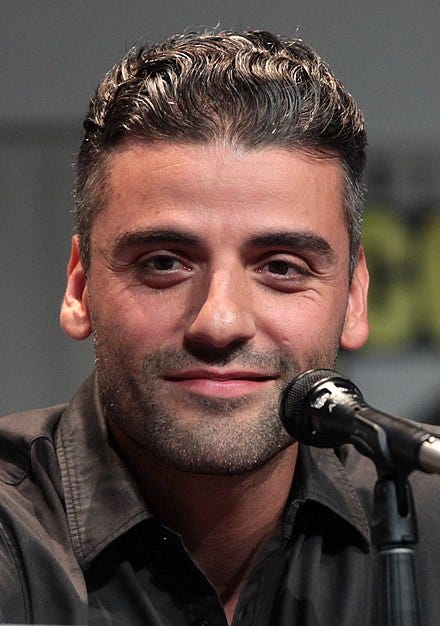HBO Remake of Ingmar Bergman’s Scenes From a Marriage
“Conceit” Hagai Levi, director of the remake, used and why it works
Note to my subscribers: I’m creating sections so that, Write it! How to get started will have its own section and other writings can appear under new headings like this one. Another new section will be (Re)Making Love: a memoir (coming soon). If you’re a paid subscriber, you’ll still get everything and, if you’re a free subscriber, you still get many posts free. I do hope you’ll consider helping me with $5 for a month and a bunch less for a year. Love to you all, no matter what you decide. ~Mary
The remake of Ingmar Bergman’s 1973 mini-series, Scenes From a Marriage, streaming on HBO was directed by Hagai Levi, teleplay by Levi and Amy Herzog. Daniel Bergman, one of the executive producers, is the son of Ingmar Bergman, who created the original Swedish TV series that was later a film, also available on HBO.
Daniel approached Levi some years ago about doing the series.
By “conceit,” I’m referring to Hagai Levi’s decision to break the fourth wall in all the episodes, with a decided difference in how he does it in the final episode. At the start of the first four episodes, Levi begins with a view of the set the stars Jessica Chastain and Oscar Isaacs enter. In the final episode, he closes with a break in the fourth wall that shows the actors getting into robes and leaving the set, arm in arm and with much real-life affection as each enters his dressing room.
Play acting over, real affection is our view—and that metaphor resounds.
Levi’s choice to use the conceit of “breaking the fourth wall” provides insight into the essential conflict in Bergman’s accoladed series.
That choice in every episode has been criticized by the critics who remain bemused—while highlighting women’s liberation, independence, and divorce.
I assert the brilliance of the conceit.
Most titles for the episodes are exactly the same. I was struck by the title “The Illiterates”.
Here’re the titles from the original six-part Bergman series. Levi used all but the second in his five episodes—and perhaps that omission is in itself revealing. I’ll explain more as I proceed.
1. “Innocence and Panic”
2. “The Art of Sweeping Things Under the Rug” (not used by Levi)
3. Pauline –“Poli” in Levi’s remake –as he has reversed the roles of the two main characters.
Levi gives the role of the partner who leaves the marriage to Mira (Jessica Chastain) along with most of the inclinations and intentions of Johan (Erland Josephson) who leaves Marianne (Liv Ulmann) from Bergman’s original, increasing the emotional weight of loss for Jonathan (Oscar Isaacs) in Hagai’s version. Important to point out here that in both versions the emotional weight and the significance of what occurs in the marital relationship weigh heavily on both partners and in both versions.
4. “Vale of tears”
5. “The Illiterates”
6. “In the Middle of the Night in a Dark House”
On “The Illiterates,” in an interview with Ben Travers of Indiewire, Levi said, “There is an episode … when Mira says that they’re illiterate about breakups, not about divorce, not about marriage.”
Having watched both the original and Hagai Levi’s remake, I assert that Levi has done a sterling job of recreating and increasing the intensity of the original. The performances by Chastain and Isaacs are marvelous, moving, and both hold the viewer with immersions in the roles.
I loved this new series, Levi’s courage in taking on a Bergman masterpiece, and bringing new depth to the roles.
The deeper conflict that Hagai Levi reveals is our understanding today of the ease of breakups and the prevalence of divorce. What he and Bergman both explore is the way we’re illiterate about the complexities of love that lasts.
Levis’ break of the fourth wall pays homage to Bergman’s achievement by showing us that these are “scenes” from another theatrical version. In the last episode of the HBO series, he does this incredibly effectively. Mira repeats to Jonathan this line: “In the middle of the night, without much fanfare, in a dark house in the middle of the world.” When asked by Jonathan: “What’s that?” She replies, “It’s from a movie.” It’s a line that Johan says to Marianne at the end of the Bergman series.
But the meaning is even more powerful for what these characters have experienced.
Breaking the fourth wall causes the viewer to step back from the play acting, to take the whole of what we’re seeing and examine our suspension of disbelief—kudos to the whole production for that achievement as each episode locks us totally in its hold.
But, perhaps, most important, is that Levi focuses us on play acting.
He causes us to check ourselves. Yes, we know for sure we’re watching a fiction that seems real. That observation is like a boomerang. We must look at his attempt in the abstract. In an interview with Ben Travers of Indiewire, Levi says, “… I kind of want you to think about it [the drama] in a more abstract way and in a way be able to project it on yourself.”
He asks us to look inside ourselves and ask key questions about what love that lasts is worth.
Most important, these “Illiterates” are play acting their way through a love that has bumped up against trouble: Another attraction, the boredom of the everyday-ness of marriage.
I think he chose not to use “Sweeping Things Under the Rug” because he doesn’t need that “telling.” He’s got more to play with about the nature of love and the “plays” we create for ourselves. He has no need for this title. Something bigger is under Levi’s rug.
What becomes clear in every episode is that despite Jonathan’s and Mira’s assertions that they’re meant to be apart, they delude themselves. They proceed to do everything they can to preserve the love they’ve broken. They do so without getting formally back together.
Too easy is the explanation that monogamy is dead. Bergman had five marriages—and that may have been his view. But I don’t think it’s Levi’s, despite his admission that he has experienced a divorce.
The power of the new HBO series is its intense focus on love that inexorably lasts, its worth. Levi intensifies the effect because in our day divorce is so common whereas in Bergman’s day, the opposite was true. As an aside, the Bergman series was credited with dramatically increasing the divorce rate in Sweden the year after the series ran.
The play acting of the characters, as each asserts the rightness of the breakup—even as they continue to be drawn to one another—is emphasized in Levi’s remake with his use, just one example, of Purim as the anniversary moment that Jonathan recalls for him and Mira. Levi, a Jewish Israeli, has given Jonathan a deeply Jewish past. Purim is the holiday for dress-up, for play acting, much as these two characters have play acted the truth of their love by disputing it only to affirm its importance.
Don’t miss Jonathan’s nightmare in the fifth episode that totally mirrors Marianne’s in the Bergman series. I won’t explain: “spoiler.”
After her similar and disturbing nightmare, Marianne, in the Bergman series, asks, “Have we missed something?”
Yes, these characters in scenes from their marriages have missed this: Play-acting as a metaphor for reality. And the reality is love that can last—despite breakage.
I speak from experience. See the memoir (Re)Making Love, available on Amazon.
Closing quote:
Or
Credits:
Photos: Bergman, Levi, Chastain, Isaacs via Wikipedia
Photo: Rug Photo by Erol Ahmed on Unsplash












Thanks for this thoughtful analysis. I watched the series, but you've given me a whole new layer of appreciation and understanding.
Thank you for another lesson. I don't have HBO. I've had it in the past and while it does some great things, I've decided I prefer other streams more. I did however familiarize myself with the original. I watched both the tv series and the movie Bergman did on the subject. I enjoyed it so much, I also watched the entire series and movie with my folks, discussing deeply after and throughout. I like that Levi updated the roles. I also like that us noting the value of depth and intimacy in a world that realizes the profit in fast food love... is a worthy goal. I enjoyed a delightful unfoldment of same. I've had a relationship developing since 1996. He's 17 years older. We recently went 385 days without physical interaction and our reunion felt just as magical as it did in the beginning. I do believe this is a worthy remake. Nice of you to write it up here.